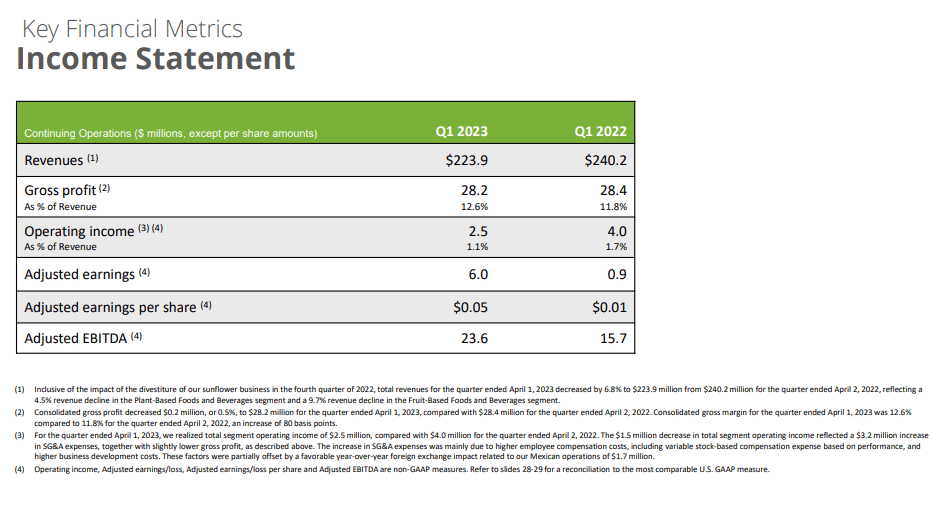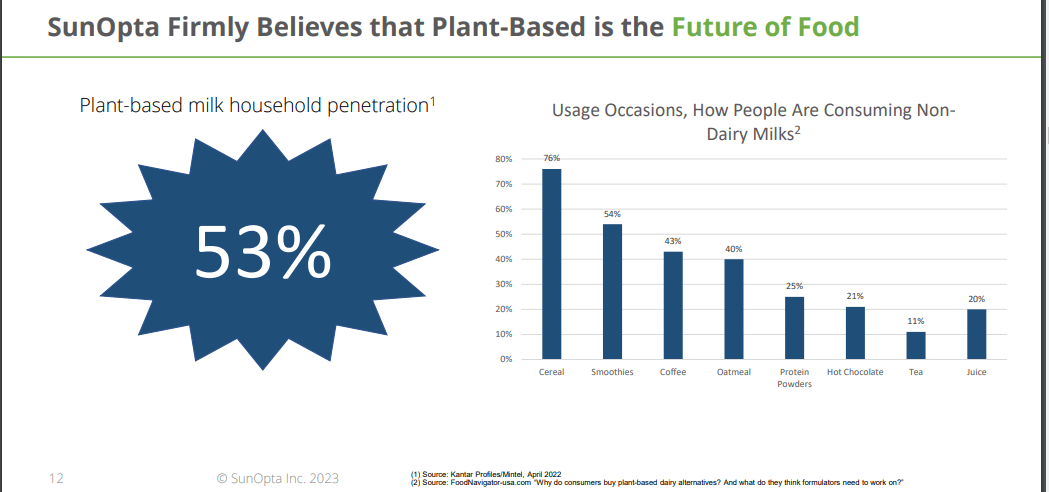SunOpta's Texas Expansion: Investing In The Future Of Plant-Based Foods

Summary
- SunOpta's strong performance in the plant-based and fruit-based food markets, backed by advanced production methods and unique collaborations, makes it an attractive investment opportunity.
- The company's Q1 2023 financials show a promising trajectory, with a 25% increase in plant-based milk items and a 50.5% rise in adjusted EBITDA to $23.6 million.
- SunOpta's new production facility in Texas will double its enterprise by 2025, reinforcing its manufacturing capabilities and addressing increasing product demand while prioritizing sustainability.
FreshSplash/E+ via Getty Images
In a world increasingly focused on health, conscious eating, and sustainability, SunOpta's (NASDAQ:STKL) exceptional performance in the ever-expanding plant-based and fruit-based food markets positions the company as a compelling investment opportunity. Driven by technologically advanced production methods and unique collaborations, SunOpta provides investors with a competitively advantageous pick in the rapidly growing plant-based food industry.
As the world becomes more aware of the impact food choices have on personal health and the environment, an unprecedented shift is occurring in the food industry towards sustainable, plant-based options. In the midst of this transformation, one company stands out as an attractive investment: SunOpta. With an extensive range of innovative products and a solid dedication to environmentally friendly practices, SunOpta is poised to capitalize on this burgeoning market trend. Backed by strong financials, strategic expansion initiatives, and relentless commitment to product development, our analysis delves into why SunOpta merits a position in any savvy investor's portfolio.
Financials
The first quarter financial outcomes for 2023 from SunOpta indicate a promising trajectory for the firm, as they concentrate on optimizing margins, increasing revenue, and fostering product ingenuity. The company's $223.9 million in revenue highlights a remarkable rise in the Plant-Based Foods and Beverages sector, driven by a 25% increase in plant-based milk items, confirming SunOpta's leading role in the ever-expanding plant-based industry.
SunOpta's firm commitment to innovation is apparent as its plant-based milk product line saw an impressive 89% growth in oat-based options, demonstrating the company's determination to fulfill consumer desires in a perpetually shifting market. This notable expansion is underpinned by a robust gross profit margin of 20%, excluding initial costs, which underscores the enterprise's strong operational performance.
The company's financial prospects are further reinforced by its emphasis on profitability, as shown by a remarkable 50.5% rise in adjusted EBITDA to $23.6 million. This, together with an adjusted gross margin of 15.2%, illustrates SunOpta's achievements in fortifying its business processes and sustaining a powerful market presence.
Although Fruit-Based Foods and Beverages revenue dropped, SunOpta's dedication to addressing new market needs is highlighted by robust demand and increased prices for fruit snacks and smoothie bowls. This reflects the organization's flexibility and adaptiveness in catering to emerging customer trends.
investor.sunopta.com
Additionally, SunOpta's new facility in Texas is set to boost its robust growth in the latter half of the year, emphasizing the firm's strategic expansion initiatives and its long-term positive outlook for 2023.
Product Line
SunOpta, an international firm with a focus on plant-based and fruit-based foods and beverages, as well as organic ingredients and organic food products, operates through three key divisions: Plant-Based Foods and Beverages, Fruit-Based Foods and Beverages, and Global Ingredients. The Plant-Based Foods and Beverages segment is dedicated to producing an extensive variety of items such as oat milk, almond milk, and other plant-derived beverages, in addition to plant-based ingredients like oat protein powder and sunflower lecithin.
Within this category, there are several notable products that stand out. One is the Oat Protein Cereal, a joint effort with Seven Sundays featuring SunOpta's OatGold-rich ingredients. Additionally, SunOpta partnered with Oatly, one of SunOpta's co-manufacturing clients to produce a delicious Plant-Based Cream Cheese. Furthermore, their product line includes a diverse range of organic and non-GMO vegetable broths and stocks, as well as a wide assortment of organic and fair-trade certified teas.
investor.sunopta.com
Simultaneously, SunOpta's Fruit-Based Foods and Beverages division creates fruit-centric beverages such as juices, smoothies, and lemonades, while also providing frozen fruits, fruit purees, fruit concentrates, and other fruit-related ingredients. Some popular items in this segment consist of individually quick frozen (IQF) fruits, organic or non-GMO verified fruit snacks like fruit bars and fruit rolls, and an array of fruit-focused ingredients, including apple purees and cranberry concentrates.
Lastly, the Global Ingredients segment centers on supplying food producers and food service clients with organic and non-GMO ingredients sourced worldwide, spanning a variety of grains, seeds, sweeteners, oils, and proteins. A selection of these offerings includes oat grains, sunflower seeds, organic cocoa products, green coffee beans, and agave syrup. By providing a broad spectrum of products and divisions, SunOpta demonstrates its unwavering dedication to delivering premium, sustainable plant-based, and fruit-based food solutions to a global audience.
SunOpta's Texas Expansion
SunOpta is launching a new plant-based drink production facility in Midlothian, Texas. This establishment will not only generate up to 175 employment opportunities but also reinforce the company's manufacturing prowess and help double its enterprise by 2025 compared to 2020. The facility will produce SunOpta's complete array of plant-derived milks and creamers, teas, and additional products, accommodating a variety of packaging dimensions and arrangements for diverse market segments.
This new establishment signifies a crucial landmark in achieving SunOpta's long-range objectives and corporate vision. The cutting-edge facility will boost the company's manufacturing and supply chain capacities, allowing them to effectively cater to the increasing demand for plant-based foods and drinks across the country. SunOpta has allocated nearly $200 million to its plant-based production capability over the past three years, aiming to double its plant-based enterprise by 2025. The Midlothian plant will further facilitate this expansion and help lower production expenses while meeting SunOpta's customers' requirements.
In alignment with the company's environmental goals, the Midlothian facility will play a part in significant carbon emissions reductions, water preservation, efficient energy usage, and recycling initiatives. It is strategically positioned in Texas, enabling SunOpta to reduce freight miles and decrease transportation-related emissions significantly. The facility boasts water reuse equipment, an energy-efficient HVAC system, LED lights, and water heaters, and employs a considerable volume of recyclable materials in building offices and labs.
At present, the production facility occupies 285,000 square feet with the potential to extend to 400,000 square feet in the future, which would render it SunOpta's largest plant for plant-based foods and drinks. The Texas facility, together with plants in California, Minnesota, and Pennsylvania, forms a competitively advantageous, diamond-shaped national network for distribution. In partnership with the City of Midlothian and other key collaborators, SunOpta is dedicated to minimizing the environmental impact of the manufacturing process.
Limitations and Risks of SunOpta's Product Design
To create high-quality products that cater to consumers looking for healthy, ethical, and environmentally friendly food choices, SunOpta leverages innovative technologies like aseptic processing, upcycling, and organic certification. However, there are potential limitations to SunOpta's product design which could impede its widespread adoption and successful commercialization.
One of these limitations is the increased production costs that come with using organic and non-GMO materials. These components are usually more expensive than conventional ones, as well as the company’s use of aseptic processing - an intricate sterilization process involving bacteria-free environments for products and packaging implementation. This raises the company’s production fees which can affect their profitability in the market and lead them to become less competitive.
Another limitation of SunOpta's product design is the limited shelf life they have due to natural ingredients and minimum preservatives used in them. For example, the firm has a 12-month expiry date on their fruit snacks made out of real fruits and all-natural sweeteners, while certain plant beverages such as oat milk and almond milk last for just 12-18 months but needs to be refrigerated after being opened. Therefore, this also restricts their product distribution and consumption when located in places where cooling facilities may not be available or dependable.
Finally, SunOpta's product designs focus on a narrow group of customers that prioritize plant-based and fruit-based products over animal-based and man-made items. Nonetheless, other buyers might have different tastes, requirements, or views about these goods, especially those who favor dairy milk over plant varieties for flavor, texture, or nutritional content. People may also be biased against or uneducated about organics or non-GMO nutrients, and hesitant to experiment with new or unfamiliar commodities. Such factors will reduce the charisma and approval of SunOpta’s products with a wider customer base.
Surpassing Competitors
SunOpta is facing competition from various companies, including Danone, Hain Celestial (HAIN), and Ingredion (INGR). By focusing on its innovative product range, SunOpta demonstrates numerous advantages over competitors in this growing market.
Danone, a global company, produces a wide array of dairy and plant-based products. However, SunOpta's commitment to utilizing upcycled ingredients, as evidenced by the Oat Protein Cereal made with SunOpta's OatGold, showcases the company's ecological awareness and increased protein content compared to Danone’s traditional cereal options. Furthermore, SunOpta's partnership with Oatly for Plant-Based Cream Cheese allows them to tap into the rapidly expanding plant-based cream cheese market against competitors such as Danone's Kite Hill plant-based cream cheese.
Hain Celestial, another competitor, offers products such as non-dairy beverages and fruit snacks. In comparison, SunOpta's IQF Fruit range sets itself apart with organic and non-GMO certified fruit, while also utilizing the advantages of quick freezing. This results in higher product quality and nutrient preservation, distinguishing it from Hain Celestial's fruit offerings.
Ingredion, a global ingredient provider, competes with SunOpta in its Global Ingredients segment. However, SunOpta's focus on sustainability through the sourcing of organic and fair-trade certified products such as cocoa and coffee, for instance, gives it a competitive edge over Ingredion, whose product portfolio may lack comparable organic and fair-trade certifications.
Conclusion
SunOpta's outstanding performance in the fast-growing plant-based and fruit-based food and beverage markets presents an attractive investment opportunity for those looking to capitalize on the surging demand for healthy, sustainable, and innovative products. SunOpta's unwavering commitment to technology-driven production techniques, creative collaborations, and eco-conscious practices will elevate the company to new heights in the industry.
The company’s investment in a new production facility in Texas further highlights the company's positive long-term outlook and strategic expansion goals. This initiative showcases SunOpta's dedication to improving its manufacturing capabilities and addressing the increasing product demand, all while prioritizing sustainability and reducing its environmental impact.
This article was written by
Analyst’s Disclosure: I/we have no stock, option or similar derivative position in any of the companies mentioned, and no plans to initiate any such positions within the next 72 hours. I wrote this article myself, and it expresses my own opinions. I am not receiving compensation for it (other than from Seeking Alpha). I have no business relationship with any company whose stock is mentioned in this article.
Seeking Alpha's Disclosure: Past performance is no guarantee of future results. No recommendation or advice is being given as to whether any investment is suitable for a particular investor. Any views or opinions expressed above may not reflect those of Seeking Alpha as a whole. Seeking Alpha is not a licensed securities dealer, broker or US investment adviser or investment bank. Our analysts are third party authors that include both professional investors and individual investors who may not be licensed or certified by any institute or regulatory body.
